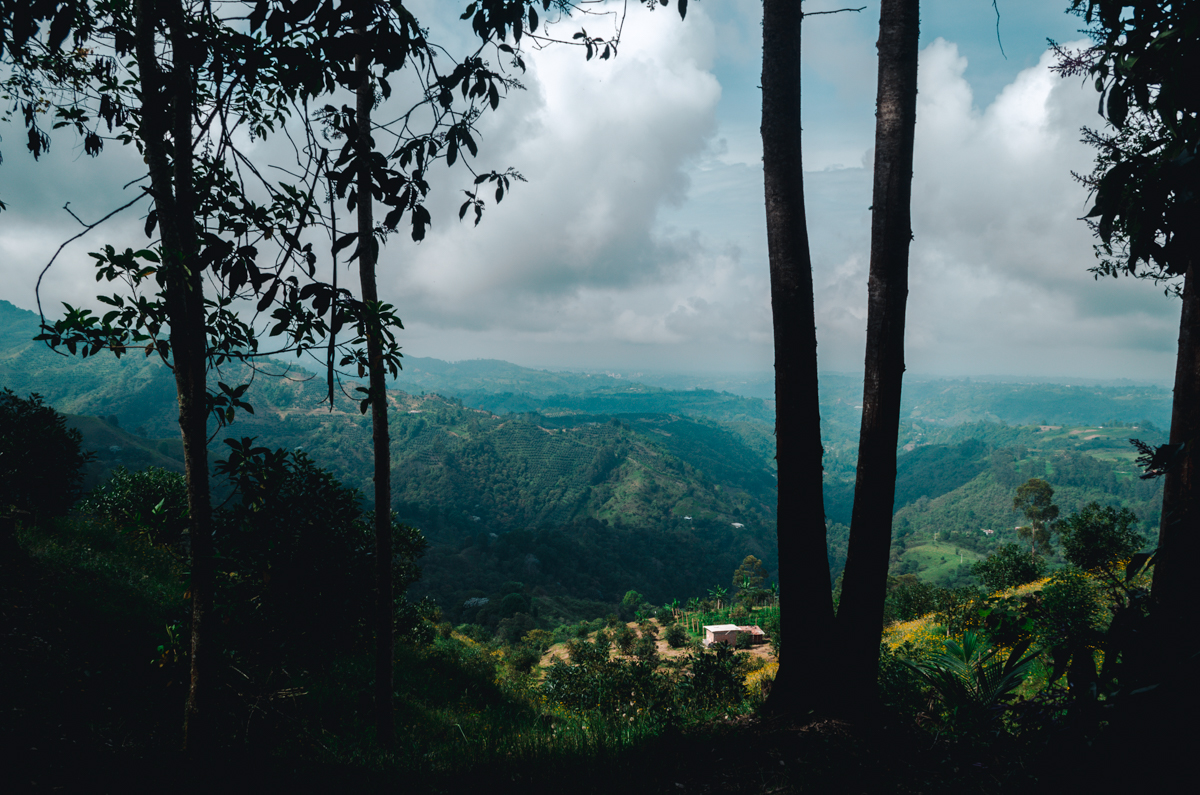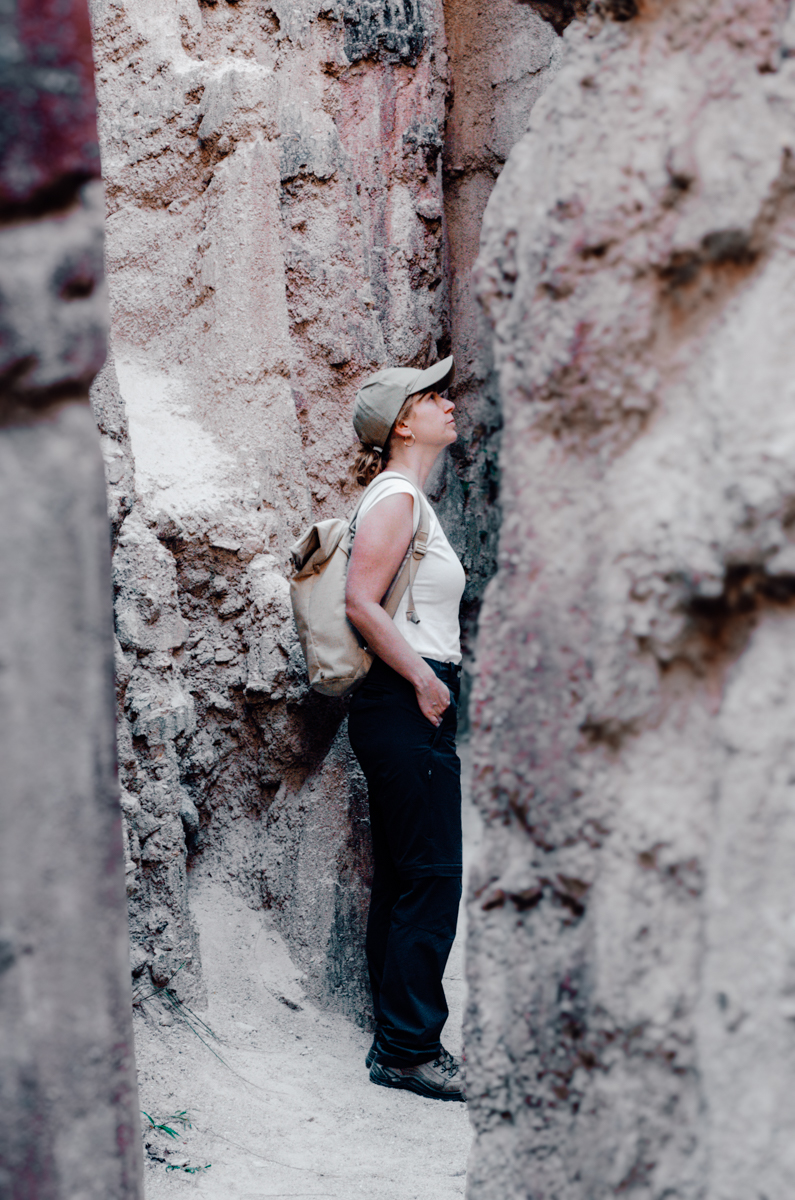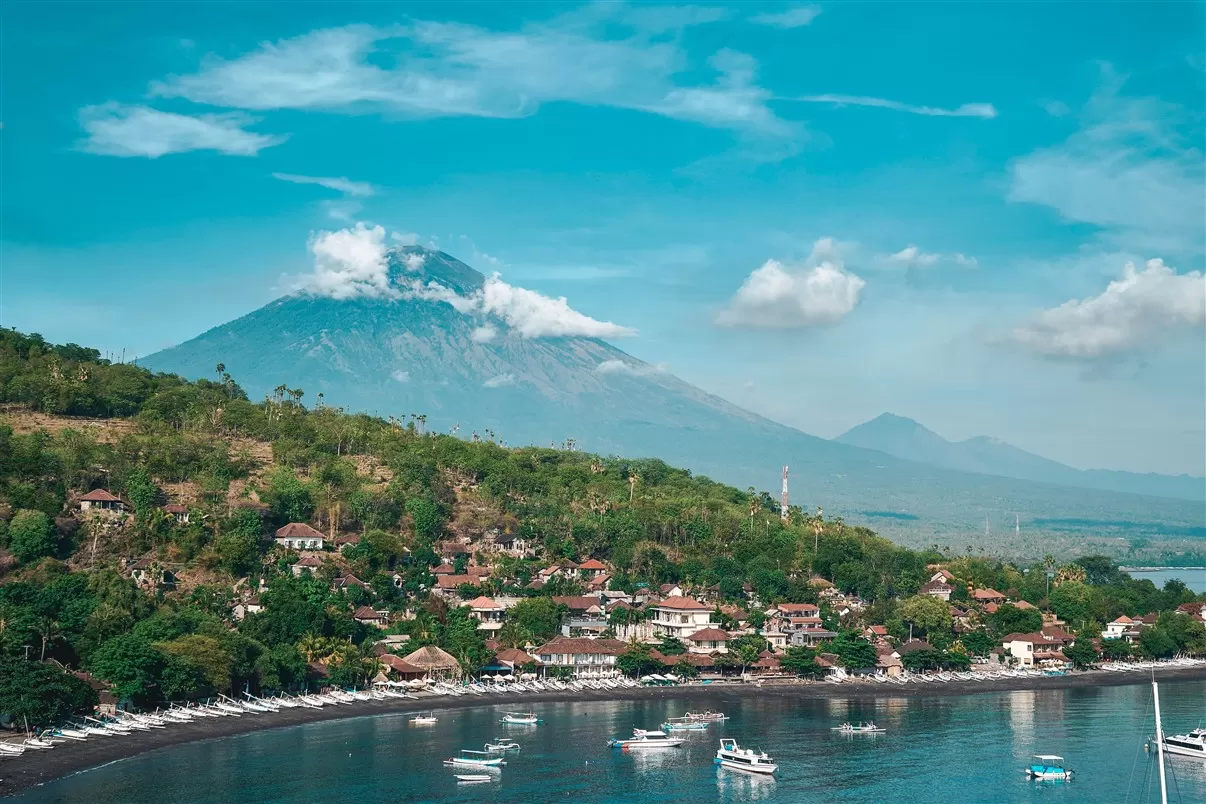
Can You Drink Tap Water in Bali? What You Need to Know!
When traveling, it’s important to learn whether the local tap water is safe to drink, as this can not only affect your health but also your trip. Nobody wants to lie in bed feeling ill when on vacation! In this blog, you can find everything you need to know about the quality of the water in Bali. Whether you’re a seasoned traveler or planning your first trip to Bali, this article will help you to address everything concerning the safety of tap water in Bali and other related questions about water consumption on this magnificent island. Here we go!
Bali
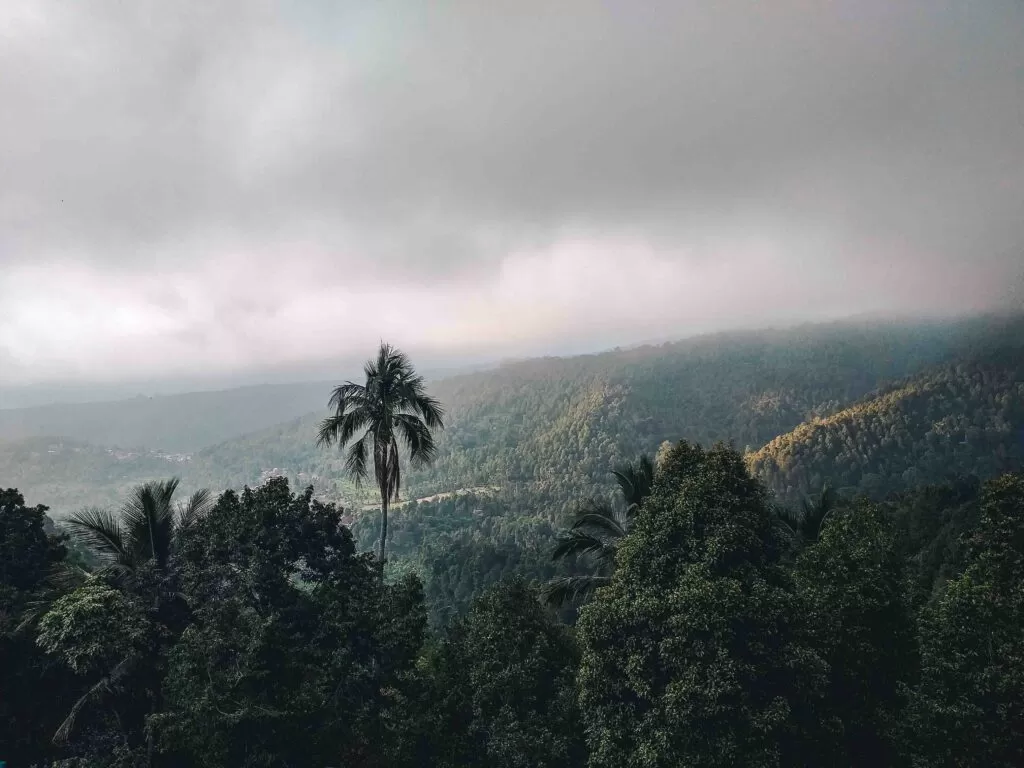
Munduk, Bali
Bali, that is also known as ‘The Island of The Gods’, is one of the most stunning locations on the planet. You might be wondering: How is it possible that this is coming out of her mouth? Bali has a problem with overtourism, why would she want to go there?
Well, because Bali is truly one of the most captivating locations in the world. There’s a reason why so many people flock to Bali. The natural landscapes, the Balinese Hinduist culture, there’s is so much to love about this island.
The problems in Bali are unsustainable development, tourism leakage, and indeed, too many crowds at popular places like Ubud and Canggu. and that’s too bad because there are a lot of hidden places in Bali that a lot of tourists have never heard of that are absolutely wonderful and free from mass tourism.
As a conscious traveler, it’s important to seek out these destinations and explore them in a sustainable way. If you want to talk about visiting Bali in a sustainable way, give me a message through my contact page!
Now, let’s talk about the tap water in Bali!
CAn you drink tap water in Bali
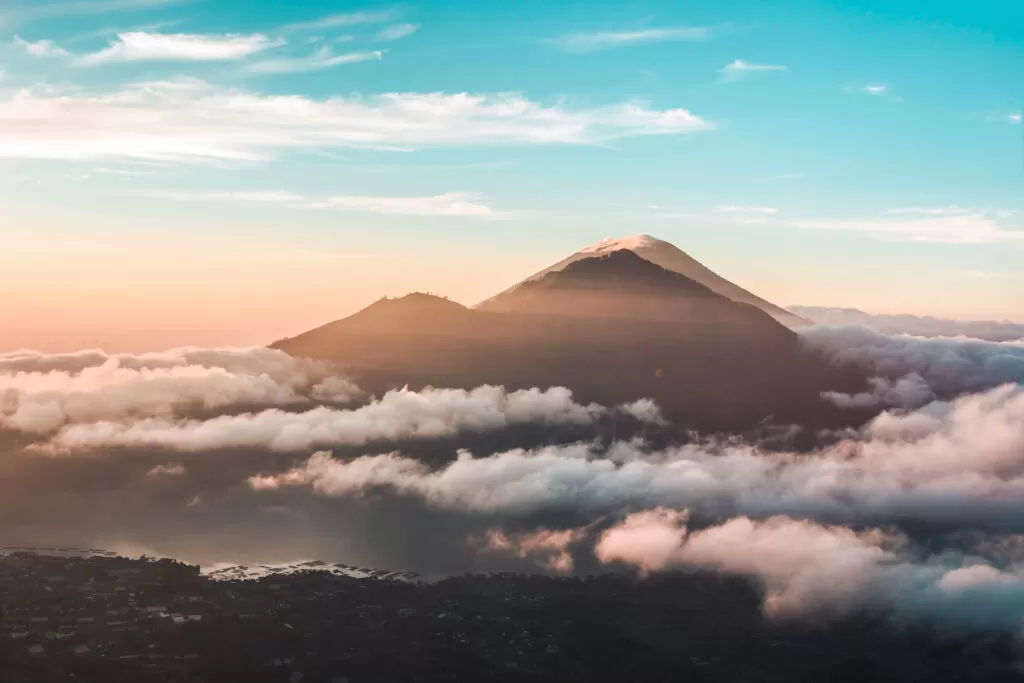
Mount Batur, Bali
Short answer, no. You can not drink tap water in Bali. Even though the island has made significant progress in recent years regarding water treatment facilities, the Bali water is considered not safe for consumption as it doesn’t meet international standards for water quality.
The tap water in Bali is not considered safe for consumption due to the presence of harmful bacteria, viruses or other contaminants. These end up in the water in a variety of ways, from heavy rainfall and flooding during the rainy season to agricultural runoff to woman still washing their clothes in rivers and peeing in them.
E. Coli is one of the most well-known bacteria that you can find in the water in Bali. This can cause bad traveler’s diarrhea. But also other waterborne diseases can be present in the water that can cause illnesses like typhoid, cholera, and hepatitis A.
Do locals drink the tap water in Bali?
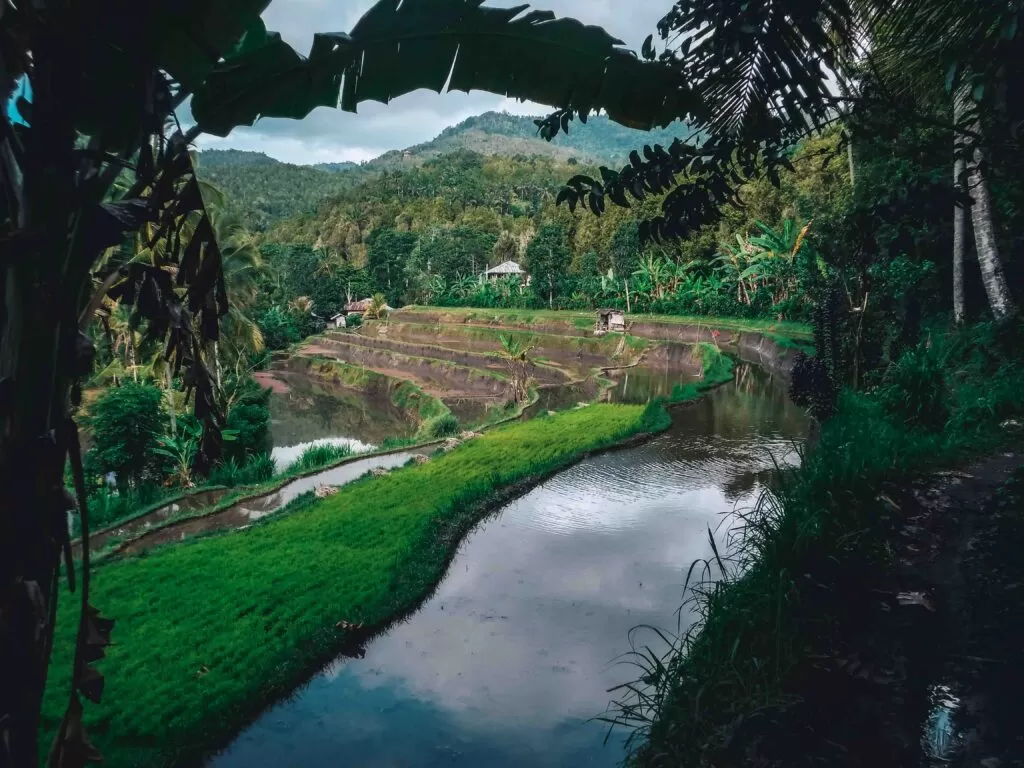
Hidden rice fields in the north of Bali
No, most of the Balinese people on the island know that the tap water is not safe for direct consumption. Instead, they buy bottled water or have a home purifier to filter out the contaminants.
Some locals may boil the tap water before drinking it and this is a great way to kill any bacteria or viruses that may be present in the water.
Can you brush your teeth with tap water?
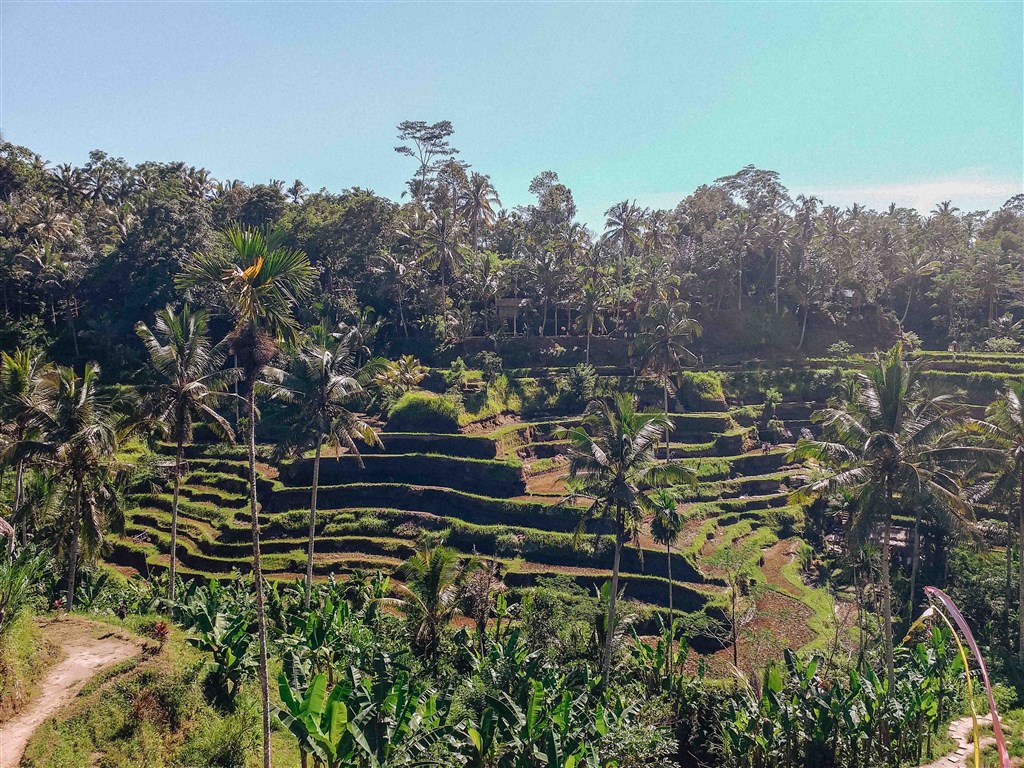
Tagallalang Rice Terraces near Ubud, Bali
While brushing your teeth with Bali’s tap water generally can’t hurt if you are on a short visit, I wouldn’t advise it. If you have a sensitive stomach like me, it can still cause stomach cramps or other discomforts and I just don’t think it’s worth the risk.
Most of the time, upon arrival at your accommodation in Bali, you’ll find small water bottles included in the room price that can be used to brush your teeth.
A lot of accommodations also offer filtered water or large dispensers that are free to use.
Is water free at restaurants in Bali
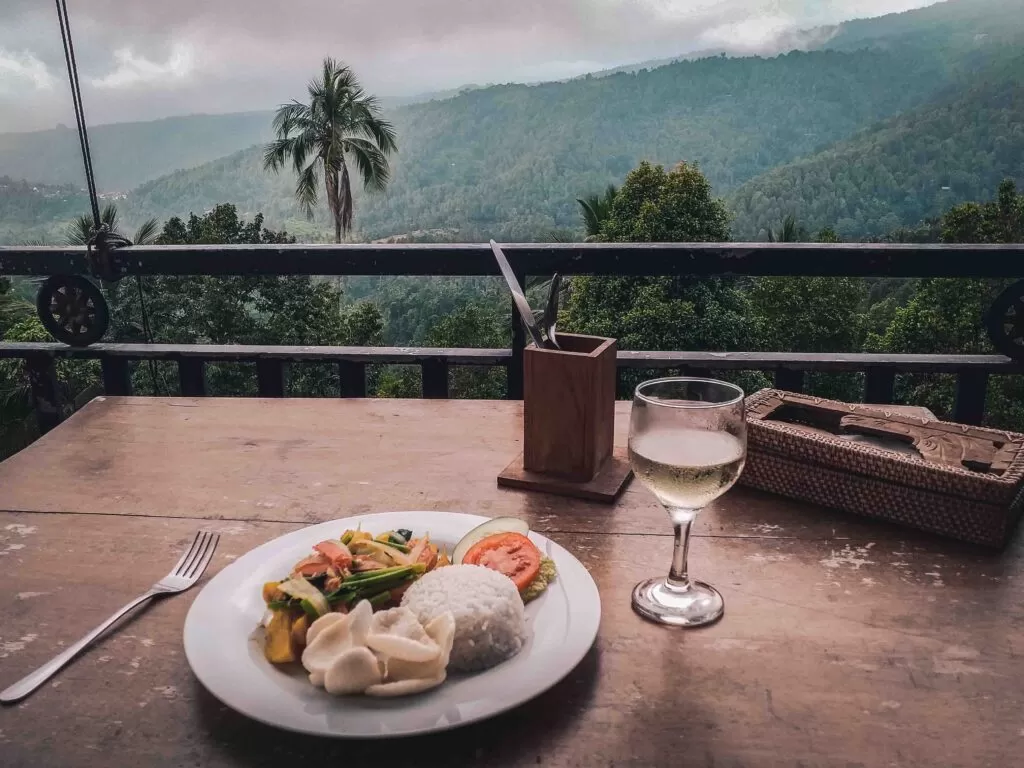
Delicious local food at a warung in Bali
No, since there’s no potable drinking water in Bali, restaurants don’t serve water for free in Bali. Bottled water is for sale though at reasonable prices and, instead of water, there are also a lot of other delicious drinks in Bali that you can try, like Mango juice or coconut water.
If you are dining at higher-end hotels or restaurants, it might be possible that they offer complimentary bottled water, but this is more of an exception and not a general rule.
Is water free at accommodations in Bali
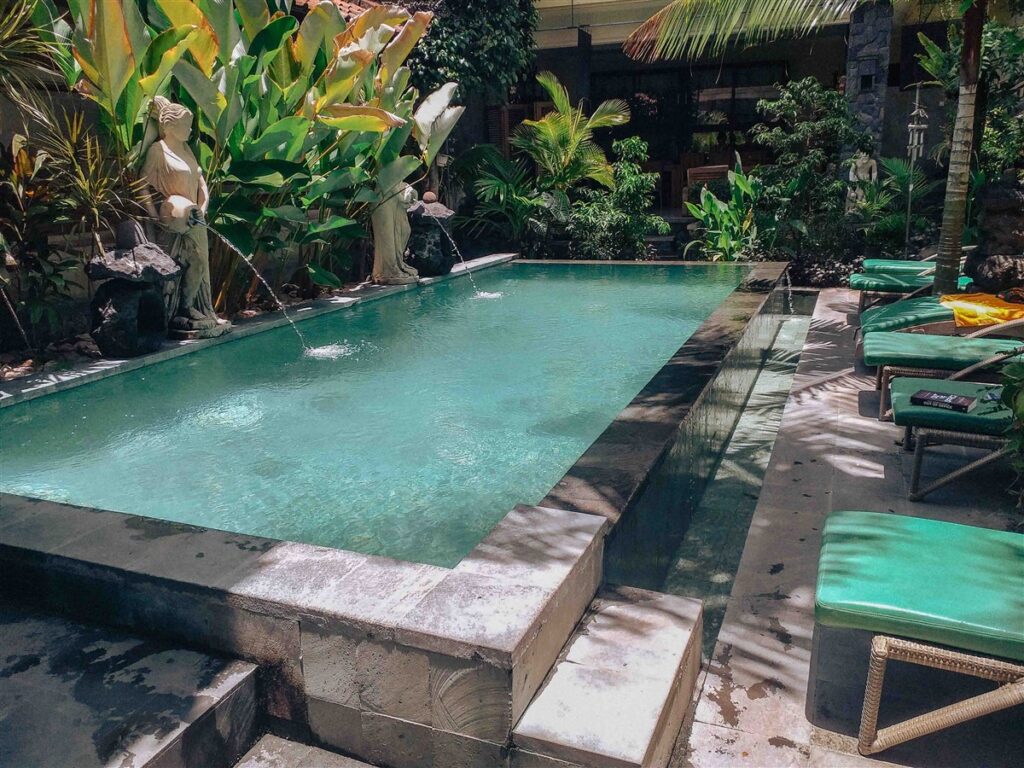
The pool of Yulia 1 homestay in Sanur
As I mentioned previously, yes, most of the time, you get two free 500 ml bottles of water while staying at accommodation in Bali. They also tend to give new bottles of water every day if there’s a daily cleaning service.
It doens’t really matter if you are staying in boutique resorts or rather small homestays with local families, free water will always be provided, either in bottles, from a purifier, or a shared tap with bottled water.
→ Also read: How to Take the Ferry from Bali to Lombok
How to safely drink tap water in Bali
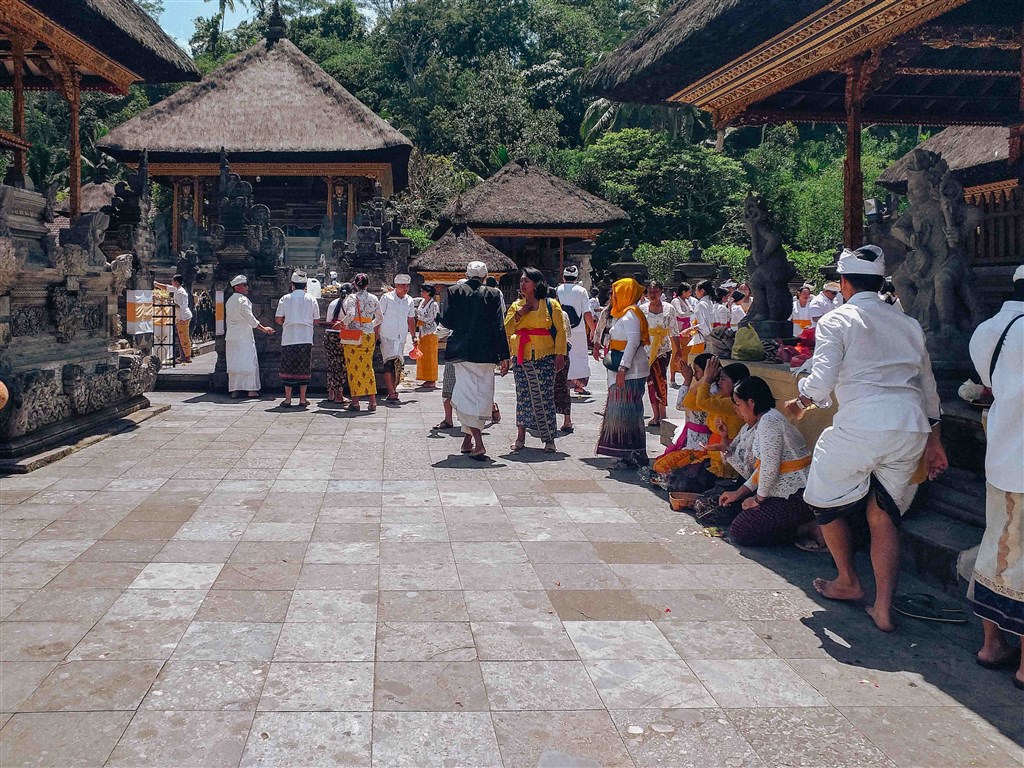
Festivities at Tirta Empul in Bali
If you’re an eco-conscious traveler like me, you are probably concerned too about the massive amounts of waste that single-use plastics cause. If, that’s the case, here are two ways to consume the Bali tap water safely and have an enjoyable trip..
Boil the tap water
While it’s not common for accommodations to have a communal kitchen in Bali and most of Southeast Asia, they do sometimes equip their rooms with an electric kettle.
I was in doubt at first if this was a safe solution for boiling water, but I did it now in various countries in the world and I’ve never gotten ill. I do boil it more than once. I put the switch of the kettle on several times or I keep it on with my finger so that it boils for at least two to three minutes.
Use a water purifier
The best way to make the drinking water potable in Bali is to use a water purifier that kills all the bacteria, viruses, parasites, and high levels of minerals.
The best water filter I found so far is the UltraPress water bottle from Grayl. This water bottle is simply amazing. It removes viruses like SARS, NORO, and Hepatitis A, kills bacteria like the dreaded E. Coli and Salmonella and also filters out other things like heavy metals, pesticides, and even microplastics.
To be safe, when you want to boil some water to have a cup of coffee or tea, I’d filter it first with a Grayl bottle before pouring it into the electric kettle!
Do note that it can also filter fresh water and even urine but not salt water.
Water purification tablets are another option, but, unlike the Grayl water bottle, most of them don’t filter out contaminants, such as heavy metals or high levels of minerals
THE BEST RESOURCES FOR INDONESIA
ACCOMMODATION
Booking.com: For the best cheap guesthouses, homestays or small hotels
Hostelworld: To find the best hostels in the cities
Homestay: For unique immersive homestays around the world
TRANSPORT
12GO: The best transport website for trains, buses, ferries, and flights, especially for South-East Asia.
Directferries: Best website to book ferries worldwide
Bikes Booking: Booking site for bikes and motorbikes in over 40 countries
ACTIVITIES
Get Your Guide: The largest booking website for activities all around the world
Eatwith: Join locals in their homes for immersive culinary experiences
With Locals: Book private tours with locals worldwide for a unique experience
VISA
To visit Bali, Indonesia, you may need a visa depending on your nationality, the purpose of your visit, and the length of your stay. Indonesia offers several visa options for travelers. The place to check these is at iVisa.
SIM CARD
Telkomsel is the best provider of Indonesian prepaid SIM cards. You can buy one at the airport, however, prices might be lower outside of the airport. Alternatively, you can buy an e-sim for Indonesia!
Should you bring a reusable water bottle to Bali
Yes, you should bring a water bottle to Bali. It’s not only environmentally-friendly but it also allows you to take refills from clean water filters or dispensers at your accommodation or at certain restaurants that have dispensers.
Restaurants charge a small fee most of the time to use them.
You can come a long way with a regular water bottle (I prefer the ones from Kleen Kanteen), but a Grayl water bottle is even better as this will allow you to filter tap water yourself or water from rivers and waterfalls in Bali.
Are ice cubes safe in Bali?
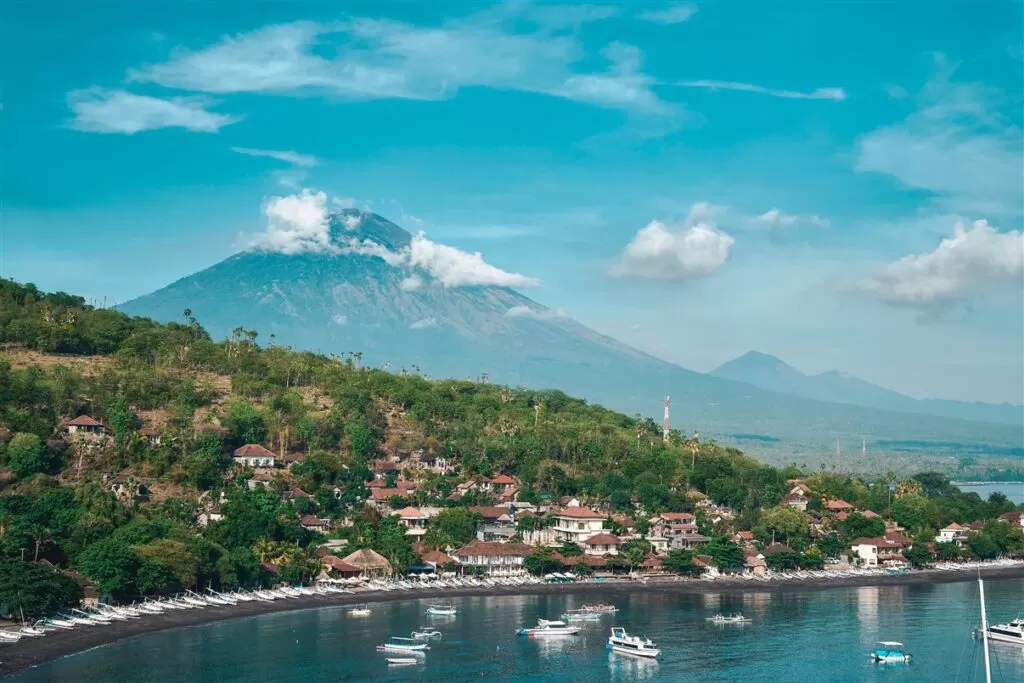
The coast of Amed in the north of Bali
Ice cubes are generally safe to consume in Bali but there are always potential risks. While you don’t need to worry in tourist areas, they might be harmful in very rural places where locals are filtering the water themselves.
I recently got E. Coli from drinking Agua panela in Colombia due to contaminated ice cubes and personally, I don’t feel like it’s worth taking the risk. From now on, I’m going to skip ice cubes altogether when I travel abroad. I’m perfectly fine with just an ice-cold drink from the fridge.
Which water brands can you find in Bali
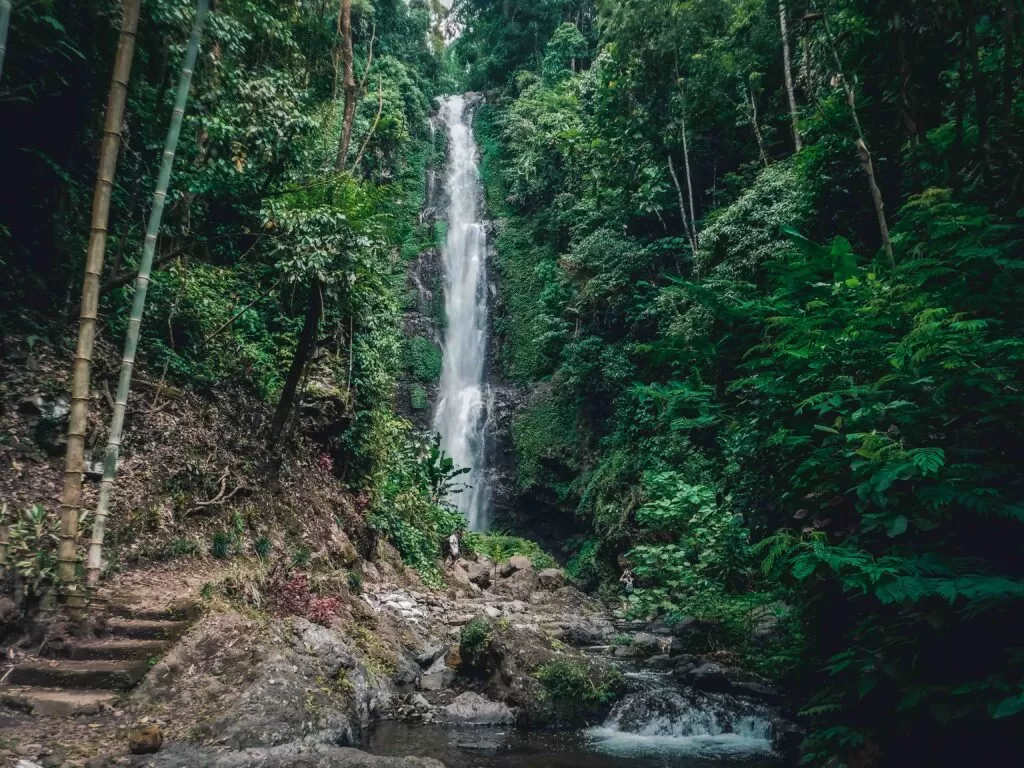
Melanting waterfall in Munduk
There are many water brands in Bali but the most popular ones are Aqua and Nestlé. Furthermore, other brands include Cleo, Ades, and VIT. You can find small and bigger water bottles everywhere in Bali, from small convenience stores to big supermarkets and even at small road stalls.
I want to mention here, again, that waste is a serious problem in Bali. Every month 6 million single-use plastic bottles are used on the island alone and there is no proper recycling system. This means that the waste ends up in landfills or the ocean or is burned illegally.
There is an initiative on the island that tries to fight this. It is called RefillMyBottle and it shows you places on the island that allow you to refill your water bottle.
I can highly recommend downloading the app!
What is Bali Belly?
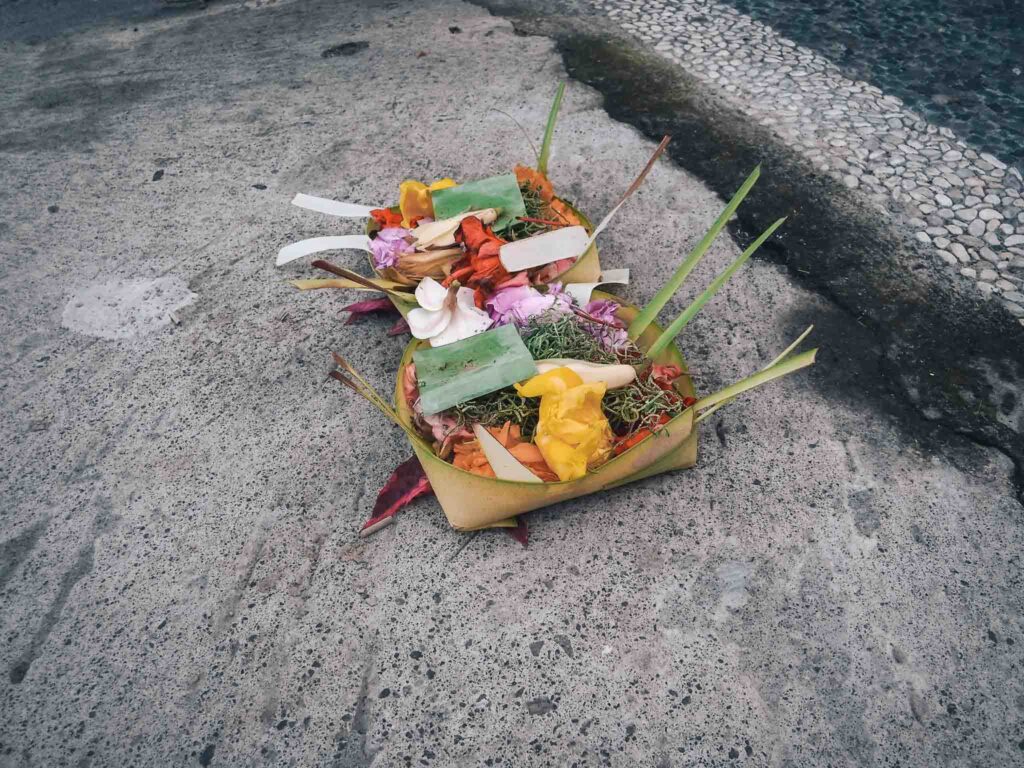
Bali Belly is a term that is used in Bali to describe traveler’s diarrhea. While it sounds like something gruesome, it is nothing more than that. Not fun, and you will be down for a few days but it’s probably due to an E. Coli infection.
Bali Belly is mostly caused by food poisoning or contaminated water. You can prevent this by drinking safe water, eating at reputable restaurants that are concerned about food safety, and practicing good hygiene.
Also, watch out for eating raw vegetables and fruit that are not peeled. It can be washed with tap water and, as a result, contain bacteria or viruses.
By this, I don’t mean that you should skip food from street vendors or anything. I adore street food! But a general rule of thumb is to look for stalls that are frequented by locals, as this will ensure that they are safe to visit.
Travel insurance
Don’t forget that travel insurance is an absolute must when you travel to Bali. If you need to be hospitalized for an infection due to food poisoning or drinking contaminated water, the costs can rise quickly, especially if you are dehydrated and need extra fluids quickly.
Believe me, I got E. Coli in Lombok and was hospitalized for two days in a small clinic in Kuta. With the amount of money that I would’ve needed to pay if I didn’t have travel insurance, I could easily travel around Indonesia for two months!
Check out Heymondo for great travel insurance to Bali. You’ll get 5% of if you use my link!
Is Bali's Water Supply Improving?

Broken beach, Nusa Penida
In recent years, the Indonesian government has been working to improve the water supply and sanitation infrastructure in Bali. Not only does single-use plastic pose a threat to the island’s beauty but there’s also water scarcity.
These threats include water shortages at hotels and for locals but also insufficient water for irrigation, affecting crops in agricultural farming.
While efforts are made, everyone should take responsibility for improving the environmental threat that comes with these issues in Bali.
Business can combat water scarity by rainwater harvesting and storage, making them less reliant on ground water and municipal water sources.
But hopefully, the wastewater treatment systems in Bali will improve soon, with membrane bioreactors and reverse osmosis systems, making them effective in producing high-quality water that is also potable.
Tap water in Bali: Final thoughts
There you go! We are at the end of this post about whether or not you can drink tap water in Bali. As you can see, it is not safe to drink tap water in Bali, unless you can boil it or bring a good water purifier.
Let me know in the comments below if you have any questions or drop me a message through my contact page.
Also, don’t forget to check out my resources page with my favorite booking platforms and tips to start planning your trip. Additionally, have a look at my favorite travel gear if you want to pack more consciously!
ENJOY!
Disclaimer: This post may include affiliate links. If you click on them, I may receive a commission at no extra cost to you.
Fancy more Bali Travel advice?
Related posts
Share:
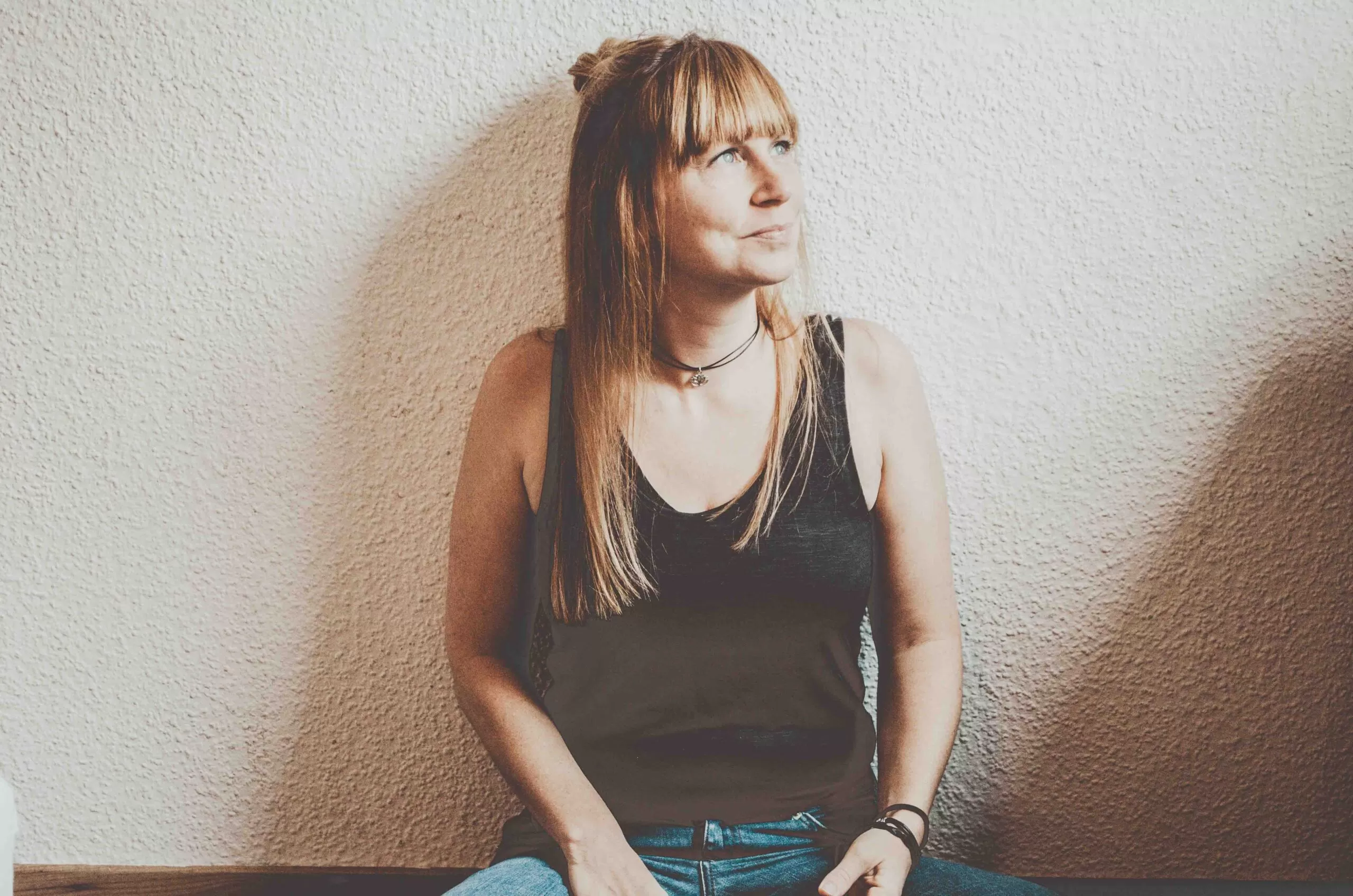
Hi! I am Annelies and this is Travelers & Dreamers, a blog about conscious travel which means traveling in a more mindful way, with a positive impact on the world and yourself!
On this website, I cover different topics like slow travel, plant-based food guides, responsible travel, sustainable packing, eco-travel, and more!
Latest Posts
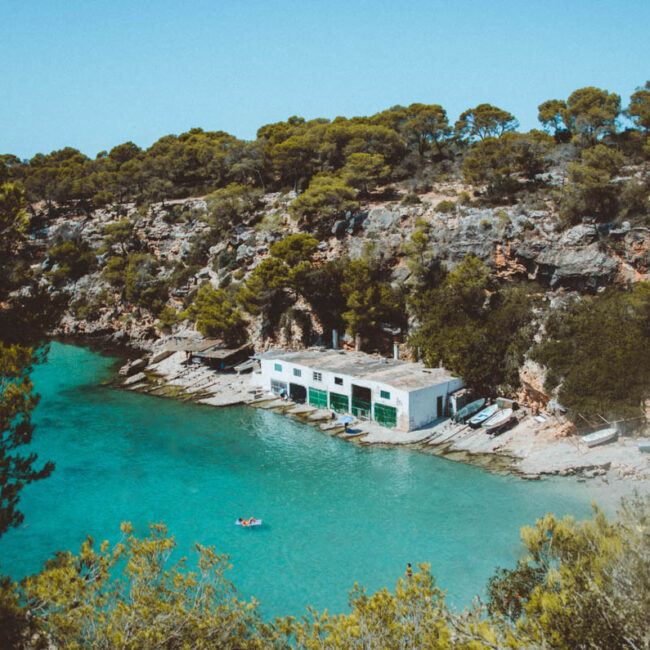
Drinking Age in Spain: What You Need to Know
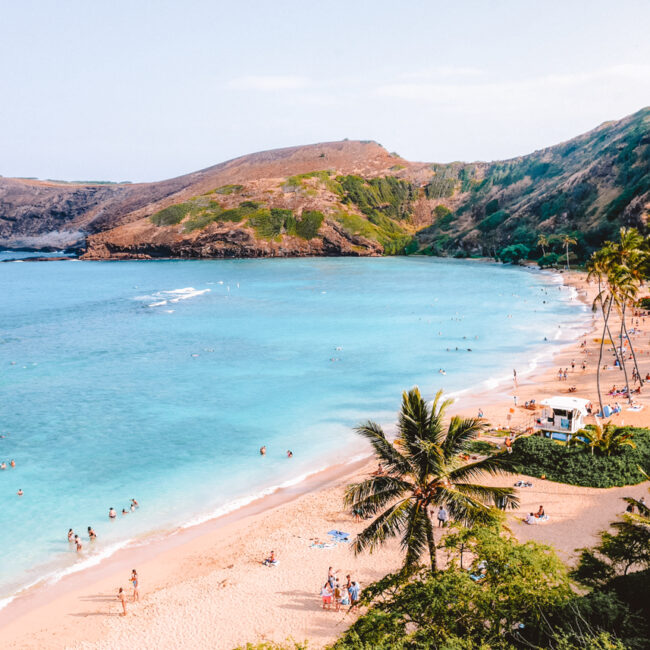
45 Best Hawaii Puns to Have a Great Laugh
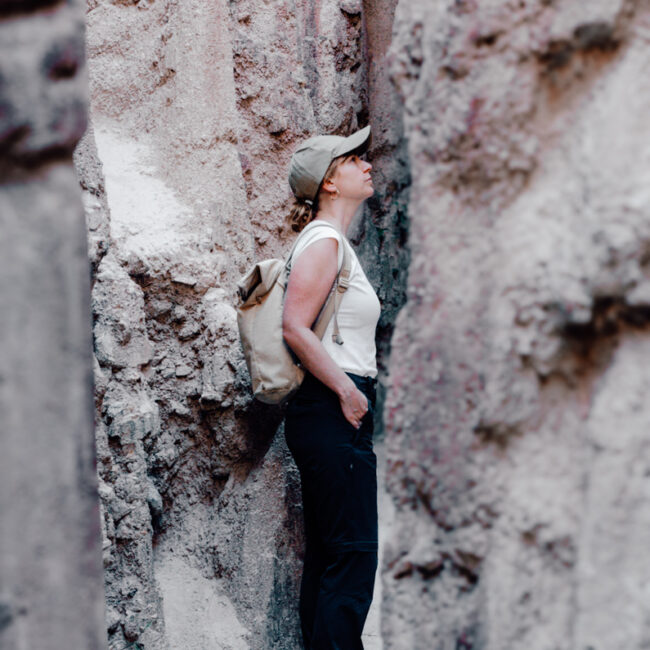
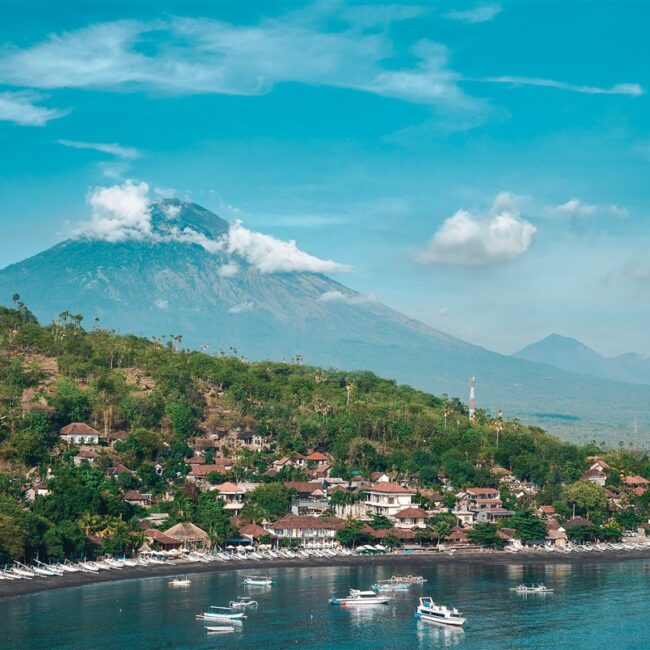
Can You Drink Tap Water in Bali? What You Need to Know!
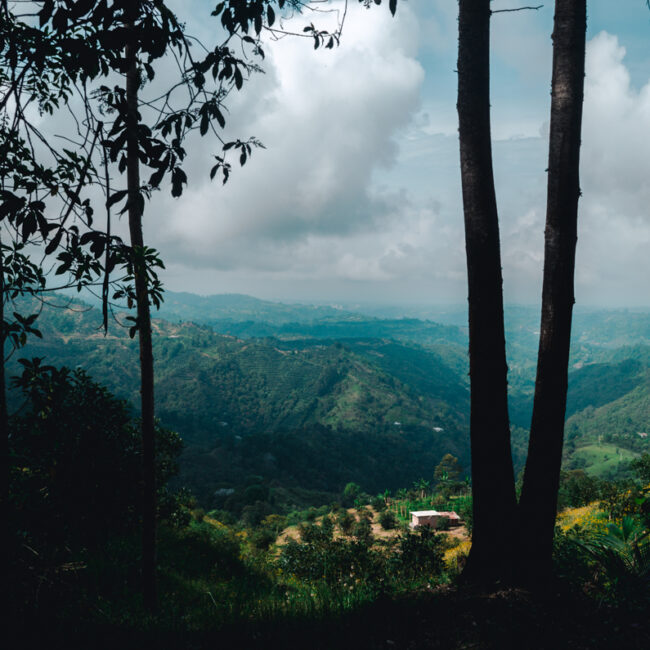
NEWSLETTER
Do you want to receive my latest finds on conscious and sustainable travel directly to your inbox? Subscribe here!

